The different diets of football players When we talk about football, we are referring to the ”king of sports” being played by children, teenagers and adults of all sexes. Evidently, the levels at which it is played are very varied: from the pachanga between friends to the international competitions in which elite sportsmen and women
La entrada NUTRITION FOR FOOTBALL PLAYERS se publicó primero en International Football Academy Soccer Interaction in spain/ Academia de fútbol.
When we talk about football, we are referring to the ”king of sports” being played by children, teenagers and adults of all sexes. Evidently, the levels at which it is played are very varied: from the pachanga between friends to the international competitions in which elite sportsmen and women participate.

It is difficult to generalise with the recommendations that can be extracted from this article and nutrition for footballers. In addition, we all have in mind the physical differences between Neuer (Bayer Munich goalkeeper) and Jordi Alba (FC Barcelona full-back), so it is difficult to group all the recommendations into one. We even have to differentiate according to the time of the season (Holway & Spriet, 2011).
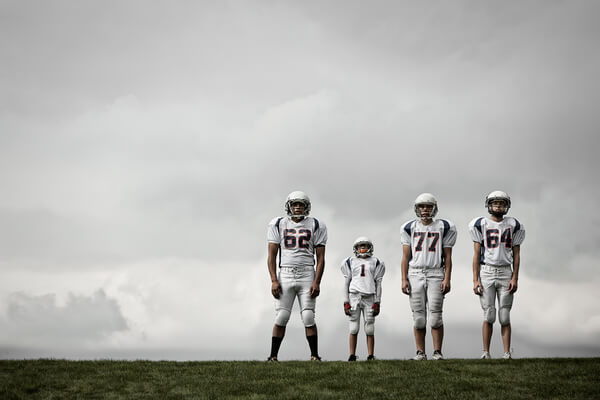
Differences can also be wide within the same group of players. For example, there may be a midfielder who has run an average of 12 km of which almost a third has been at high intensity, while his teammate may have a 10 km total with 2 km at high intensity.
In a general way, we will try to refer to nutrition for football players who play at least one match a week and have a minimum of two training sessions (training sessions such as those of the FC Porto Dragon Force school within the Soccer inter-action academy), so this text may be useful for those who compete in lower divisions and even for parents..

As we know, football is a highly intermittent sport with high intensity running and very specific actions that demand a high endurance capacity. Maximum effort actions alternate with periods of jogging or walking in which active or passive recovery takes place. This makes it clear that different metabolic pathways are involved to obtain energy (Williams & Rollo, 2015).
On average, more or less, during the 90 minutes of a match, outfield footballers (all except the goalkeeper):
Obviously, in those matches that require extra time and the time increases to 120 minutes, all these figures will be increased.
All these efforts will lead to partial (or total) depletion of glycogen stores, dehydration and hyperthermia, which could be related to the onset of fatigue. In fact, it has been observed that the number of sprints, high intensity runs and distance covered are lower in the second part and especially in the last 15 minutes, which is perfectly logical.
The search for strategies focused on reducing this fatigue will be key to try to make the difference with the opponent and achieve victory.
Not only metabolic factors or energy requirements will be important when structuring the diet before a match, but also the location of the match, the time available for meals and the players’ own tastes will be fundamental.
If we talk about the “star” nutrients in terms of fuel for football, it would be carbohydrates.
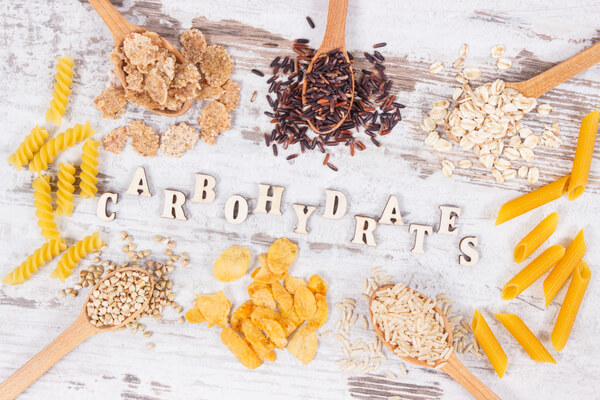
Carbohydrates are the sugars, starches and fibres found in a wide variety of foods such as fruits, grains, vegetables and dairy products. They are called carbohydrates because on a chemical level they contain carbon, hydrogen and oxygen.
Carbohydrates are one of the basic food groups and are important for healthy living and avoiding injury. They are macronutrients, which means that they are one of the three main forms of substances used by the human body for energy or calories. All macronutrients must be obtained from the diet; the body cannot produce them on its own.
Carbohydrates provide the body with glucose, which is converted into energy, which in turn is used to maintain bodily functions and physical activity.
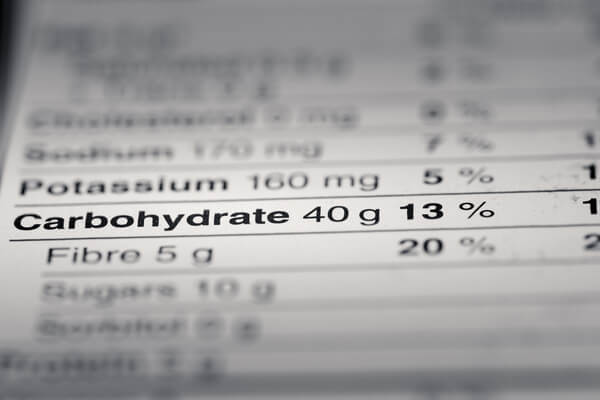
The healthiest sources of carbohydrates are unprocessed or minimally processed carbohydrates such as whole grains, vegetables, fruits and grains.
The least healthy sources include white bread, cakes, sugary soft drinks and other highly processed or refined foods. Thus we can distinguish according to the ”blood glucose spike” between:
Table 1. Different glycaemic indices in different foods.
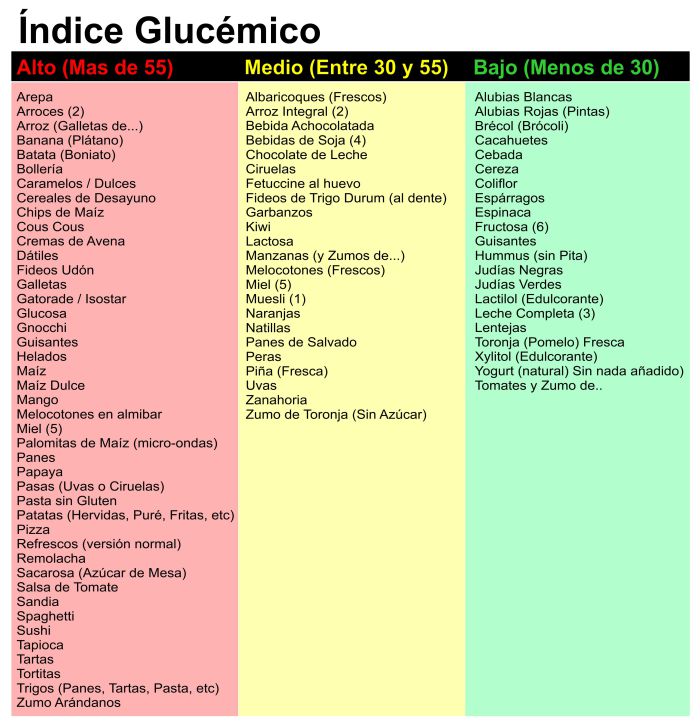
Knowing this, we must reach a compromise between consuming sufficient quantities and avoiding gastrointestinal problems during the meeting that could occur as a result of excessive intakes.
Something that has been observed in studies on top-level players, such as this one by Lian Anderson, is that, although on match days the energy and carbohydrate requirements are greater, due to the stress generated by the match itself or the possible travel that players may have to do, the eating pattern is altered by this stress, making it difficult for the requirements to adapt (Holway & Spriet, 2011; Anderson L et al, 2017).
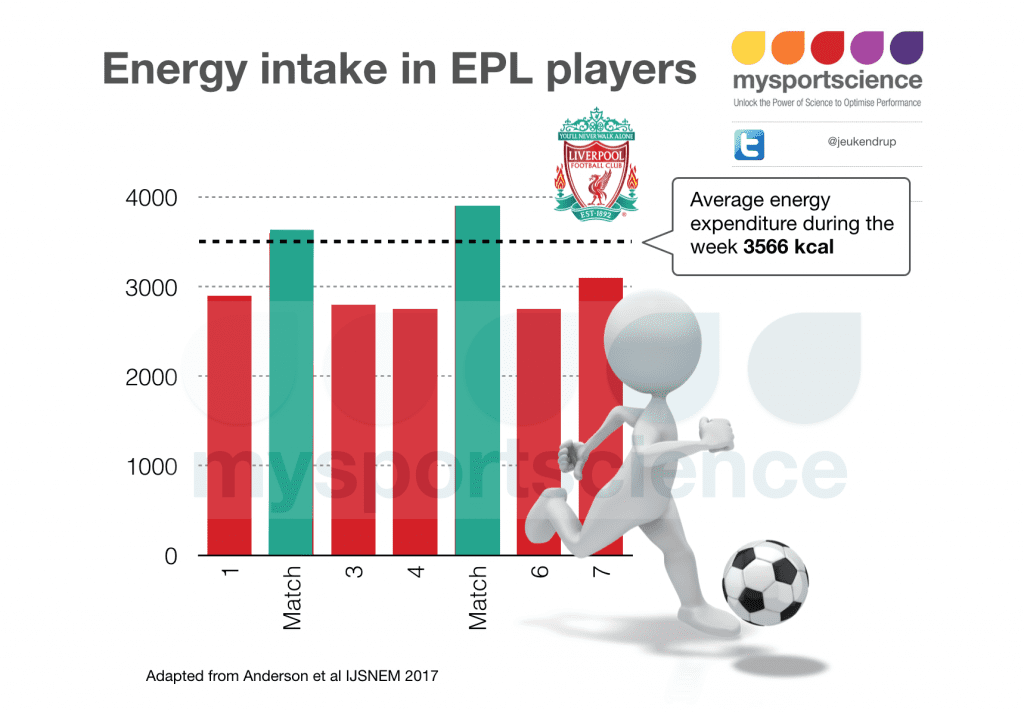
Infografía 1: Tomada de Jeukendrup A.
Although as in almost every field of nutrition there are studies for and against, the evidence strongly suggests that eating a high-carbohydrate meal before exercise is beneficial to performance.
Perhaps surprisingly for many, numerous studies have argued that carbohydrates consumed before exercise should be low on the glycaemic index, as these carbohydrates have been shown to maintain constant blood glucose levels for longer than high-glycaemic index carbohydrates and also to promote greater utilisation of fat as fuel and to exert a protective effect on glycogen stores and delay the onset of fatigue.
Another point in favour of low glycaemic carbohydrates as a pre-exercise meal is that they appear to prevent the onset of hunger.
In view of these results, it seems advisable to choose foods that provide low glycaemic carbohydrates, which should be consumed in the 2-4 hours prior to the match.
However, as we said at the beginning, football does not use only one energy pathway to meet the demands of the game or training, but explosive efforts require the breakdown of glycogen (carbohydrate stores in the muscle and liver) and phosphocreatine for the rapid production of ATP (energy). This is very important because it is known that the use of fat as the primary fuel, in this case derived from the consumption of low glycaemic index carbohydrates, is not able to provide energy fast enough for the demands of high intensity exercise (Williams & Rollo, 2015).
Undoubtedly, striking a balance between high and low glycaemic carbohydrates will be vital to achieve:
– Starting with maximum glycogen stores.
– Maintain adequate blood glucose levels throughout the match.
– Avoid the onset of fatigue in the final stretch of the match.
– Reaching the recommended carbohydrate amounts without causing discomfort.
In order to achieve this, the recovery strategy after each match and training session will be very important, as we will see below, especially when there is little time (2 – 3 days) between matches.

As a general recommendation, we could say that the type of carbohydrate (low or high glycaemic index) will depend on how the athlete’s glycogen stores are (Holway & Spriet, 2011; Williams & Serratosa, 2006). That is, if after the previous match or after a series of intense training sessions the recommended amounts of carbohydrate have not been consumed to ensure replenishment of stores, high glycaemic carbohydrates may need to be emphasised in the pre-game meal.
It has been observed that, although there is insufficient time (<3 hours between meals and matches) to regenerate liver and muscle stores, an increase in stores of 11-15% can be achieved by ingesting high-glycaemic carbohydrates, which does not occur after consuming an equivalent amount of low-glycaemic carbohydrates (Williams & Rollo, 2015). Conversely, if post-match/post-training recovery has been adequate, moderate-low glycaemic index carbohydrates placed as a pre-game meal can be a very good option given the benefits described above. With this in mind, these are different options to consider:
Another problem faced by a footballer in every match is a decrease in energy due to a reduction in glycogen stores, which leads to a decrease in metres travelled, intensity and slower decision making. This is why it is important to take hydrates during the match, such as isotonic drinks, gels, gummies, etc., using breaks in the game and rest as key times to introduce them (Holway & Spriet, 2011).
Based on the existing evidence, we can say that the consumption of carbohydrate-enriched drinks (6% concentration, i.e. 6g of sugars per 100ml) together with electrolytes during the match offers clear advantages over water intake, such as improved sprint speed, motor skills and even mood in the final minutes. These positive effects have also been observed when subjects started with good pre-exercise glycogen levels (Williams & Rollo, 2015).
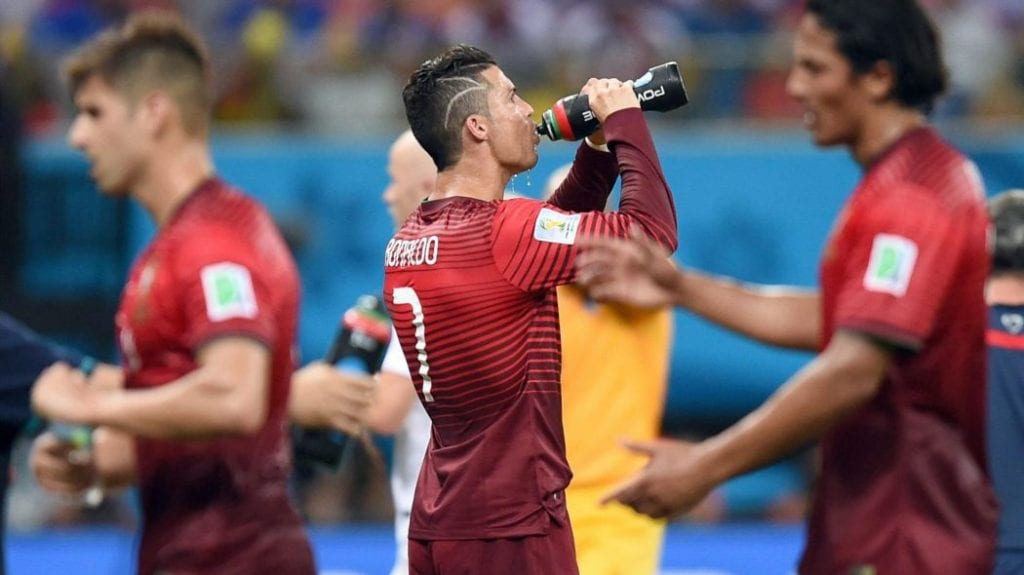
With the number of times we have mentioned glycogen in this article, I’m sure you can guess where the recovery strategy will be directed. Indeed, trying to regenerate those valuable muscle and liver glycogen stores so that they are at full strength for the next match, but it will also be very important to speed up the repair of muscle damage from the match and rehydration of the player. This is especially important when matches are played a few days later (Ranchordas et al., 2017).
This is important as there is a higher rate of glycogen recovery in the first 2 hours post-exercise, so delaying carbohydrate and fluid intake beyond this margin may compromise the restoration of stores. Footballers should therefore be encouraged to consume replenishment drinks or snacks as soon as possible after the final whistle (Williams & Rollo, 2015).
The general recommendation for carbohydrate intake within the first 4 hours after a match is between 1 – 1.5 g/kg bw/hour, preferably taken frequently (every 30 minutes) rather than over longer periods of time and which are also of a high glycaemic index. Similarly, the addition of 0.2 – 0.5 g/kg wt protein to carbohydrate can improve glycogen resynthesis and enhance muscle damage repair (Ranchordas et al., 2017). Generally speaking, a 60kg person should take in 60g-90g of carbohydrate and 18-30g of protein.
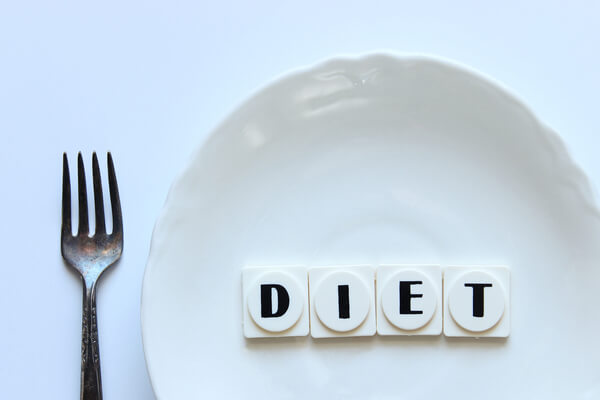
– 250-350 ml of milk shake or fruit smoothie
– 2 slices of bread/toast with jam, banana or honey.
– 2 cereal bars
– 300g stuffed jacket potato
– 2 carbohydrate gels
– 700-800ml sports drink
– Fruit salad with 200g of yoghurt
– Sandwich with meat filling
– Sports bar
– Rice pancakes
– Stuffed wrap pancakes
– Medium popcorn bowl
– Medium sweet potato bowl
– Medium thin-bottomed pizza
– Panini
– 300ml milk or milk shake
– 20-30g protein-enriched sports bar
– 10-15g whey protein powder
– 200g Greek yoghurt
– 250g low-fat custard
An important aspect is to avoid gastrointestinal discomfort from large carbohydrate intakes, for which multi-transporter carbohydrate mixtures (glucose : fructose, maltodextrins : fructose, etc.) are very useful, as we have already seen in the article on gastrointestinal discomfort.
Beyond post-match, the carbohydrate recommendation for the overall day in peak match weeks (2-3 matches/week) is around 6-10 g/kg bw/day, which is recommended to be consumed in 3-4 main meals supplemented by frequent snacks.
The truth is that unlike carbohydrates, there is little written about fat and protein requirements for football players. However, some authors (Ranchordas et al., 2017) recommend protein intakes of between 1.5 – 2 g/kg body weight per day, with fat accounting for the remaining energy until the requirements are met. In addition, they recommend spreading these proteins over several intakes (about 6 x 20 – 25g protein; total 120 – 150g protein/day) every 3 hours.
As for post-match, the same authors say that introducing a small amount of protein (40g is sufficient) is beneficial to maximise muscle protein synthesis and mitigate muscle damage. If you look at a 75 kg footballer, an intake of 35-40g of protein would be approximately 0.5g/kg of weight, so it would meet the recommendation to maximise glycogen reloading.
On the other hand, it is difficult to find specific recommendations on the amount of fats to be consumed by these athletes, as they are usually simply the energy remainder of the carbohydrate and protein intake. If we analyse a compilation of articles collected by Holway & Spriet in 2011, in which the dietary intakes of more than 300 professional and semi-professional footballers were collected, we see that the daily percentage of energy corresponding to fat is, in the vast majority of cases, between 25-35%.
As in many other sporting disciplines, it has been repeatedly observed that footballers exhibit some degree of dehydration even before the start of a match or training session (Holway & Spriet, 2011; Maughan et al., 2007). Given the clear relationship between dehydration and factors such as fatigue or the onset of cramps, controlling fluid intake will be of equal or greater importance than adjusting macronutrients.
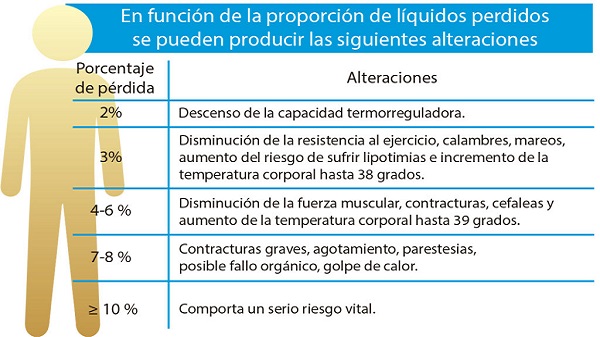
Imagen 1. Consecuencias de la deshidratación en futbolistas.
In addition to water loss, one of the main causes of muscle cramps and spasms is the loss of sodium through sweat.
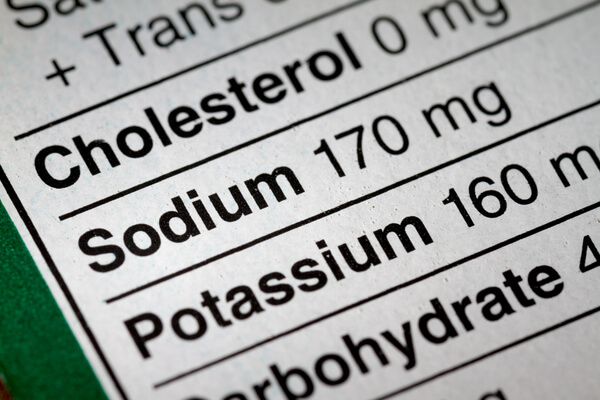
This will depend very much on the sweat rate and salt losses of the individual player, which can vary from less than 1 g to more than 10 g. In cases where there are large sweat losses, drinks providing between 20 – 25 mmol/L sodium can be really helpful (Maughan et al., 2007).
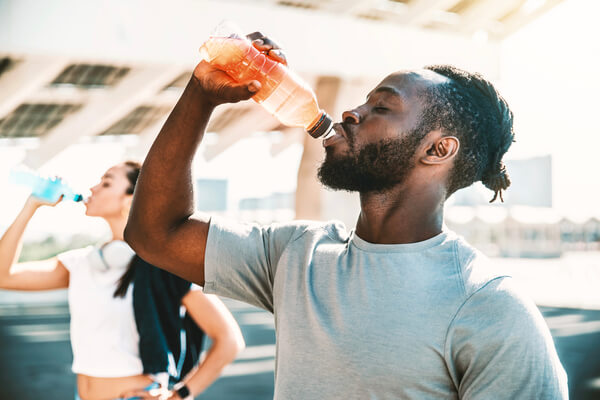
It has been observed that the consumption of about 600 ml of water or sports drink 30-45 minutes beforehand leads the athlete to a good state of hydration (Holway & Spriet, 2011).
Other factors that will affect an athlete’s hydration status include match day stress, which may alter normal fluid intake patterns, and if the match is played in hot climates with high humidity.
A simple strategy to try and control hydration levels during the match is to ensure that approximately half a litre of sports drink is consumed at half-time.
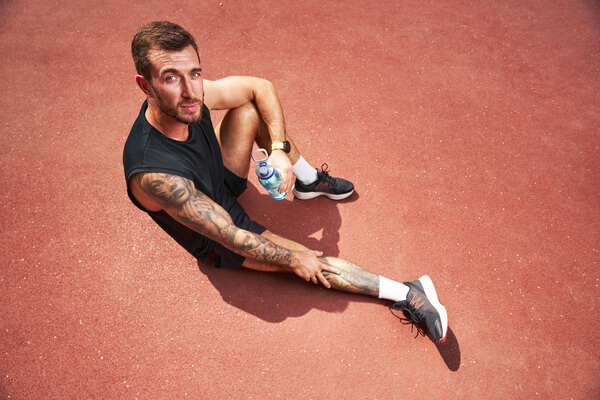
Rehydration is particularly important during post-match recovery, especially if the next match is to be played within a few days or if we are talking about double training days. Obviously, the composition of the drink used will influence the rehydration capacity, with the recommendation (Heaton et al., 2017) being to consume between 1 – 1.5 L of drink per kg of weight lost, containing 20 – 50 mmol/L (Heaton et al., 2017; Ranchordas et al., 2017) and 6 – 12% carbohydrates.
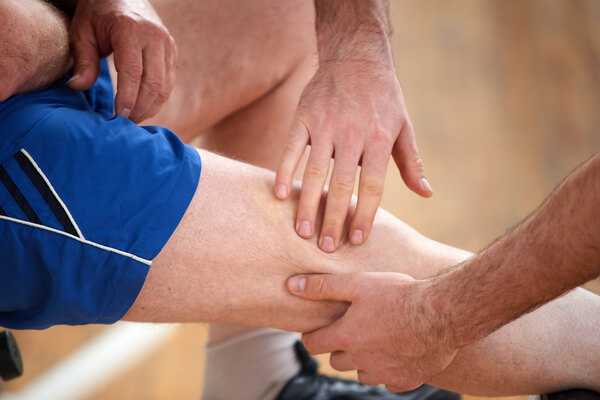
Sodium, in addition to being the main electrolyte lost through sweating, improves the palatability of the drink and stimulates the desire to drink, which, together with its ability to promote fluid retention, makes it an indispensable element of replacement drinks.
With regard to carbohydrates, we must bear in mind that more concentrated drinks (10-12% carbohydrates) are more likely to cause gastrointestinal discomfort, something that can be solved, for example, by combining carbohydrates from multiple transporters, as mentioned above, by introducing high molecular weight carbohydrates or simply by consuming drinks with more moderate concentrations and which have been tested beforehand.
Water as such is not a good replenishment drink as it lacks electrolytes and carbohydrates.
As mentioned above, the supply of fluids and carbohydrates can be provided in different ways: with sports drinks, with gels and water or with natural fruit.
Correct hydration with electrolytes during the match will help to avoid muscle cramps and prevent a decrease in the player’s performance during the match. Hydration losses are difficult to predict as they are closely linked to the ambient temperature and the individual player. Players must learn to know their usual level of perspiration in order to hydrate correctly.
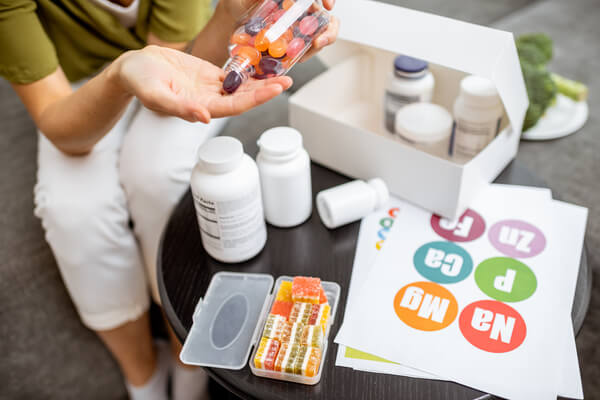
There are few studies that have directly demonstrated (due to the lack of studies and the difficulty of conducting them in football) the benefits of nutritional supplements on football performance. Creatine is one of the most commonly used supplements, as there is evidence of the benefits of creatine loading on performance in bouts of repeated high intensity physical activity with a short recovery period.
The recommended loading dose of creatine is between 20-30g/day spread over several doses for 5 days. The appropriate amount for maintenance decreases to 2-5g/day. Creatine consumption should be taken in conjunction with carbohydrate-containing meals to improve the response. It should be noted that creatine loading results in a weight gain of approximately 1kg, presumably from fluid retention.
Caffeine may improve prolonged exercise performance by reducing the perception of fatigue. A dose of 20mg of caffeine per kg of bodyweight is sufficient to be effective. It should be taken just before the onset of fatigue.
With all that has been explained here, a menu of a professional team can be seen below as an example.
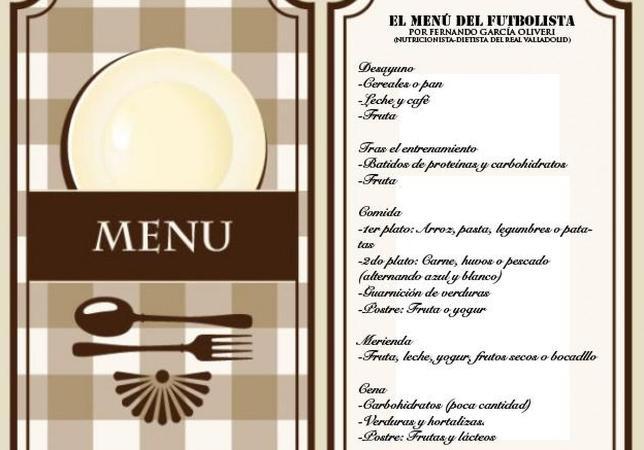
Miquel Pérez Martí.
Dietista- Nutricionista. Col CV00849.
F C Porto- DF Valencia-Enguera
Referencias
La entrada NUTRITION FOR FOOTBALL PLAYERS se publicó primero en International Football Academy Soccer Interaction in spain/ Academia de fútbol.